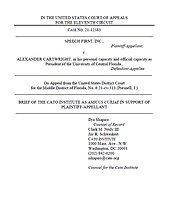Learn more about Cato’s Amicus Briefs Program.
The unflinching protection of freedom of speech is “nowhere more vital than in the community of American schools.” Shelton v. Tucker, 364 U.S. 479, 487 (1960). This principle is both an axiom of First Amendment doctrine, as well as a basic tenet of classical liberal political philosophy. The flourishing of an intellectual “marketplace of ideas” depends on the vigorous clash of viewpoints and constant questioning of accepted truths. But the prevailing trend in a troubling number of public universities today is to deny this tradition of academic freedom, both by policing the boundaries of the scope of “acceptable” ideas and restricting their modes of expression.
Several policies adopted by the University of Central Florida exemplify this distressing trend. The school has adopted a nominal “anti-harassment” policy that, both as written and as applied in practice, effects content-based and viewpoint-based restrictions on campus speech, and it employs “bias-response teams” that have the authority to investigate and respond to broadly defined “bias-related incidents,” and whose membership is drawn from the UCF office that oversees student discipline and the UCF Police Department. Speech First, a nationwide organization dedicated to protecting student speech, filed a civil rights suit against the school on behalf of several anonymous students, but the district court rejected their request for a preliminary injunction, on the grounds that (1) the anti-harassment policy did not actually regulate protected speech at all, and (2) UCF’s bias-response teams do not have the formal power to punish students.
Cato has therefore filed an amicus brief in support of Speech First’s appeal to the Eleventh Circuit. Our brief explains how the district court’s reasoning implicitly reifies the unlawful and unworthy notion that public universities have greater leeway than other government bodies to restrict the freedom of speech. The Supreme Court has long made clear that the protections of the First Amendment, if anything, are heightened in the public university setting, not diminished. Yet if the equivalent policies employed by UCF were adopted by a town or a state legislature, there would be little doubt as to their unconstitutionality.
For example, UCF’s “harassment” policy specifically prohibits “verbal acts” and “graphic or written statements” based upon a wide array of protected characteristics (race, sex, religion, political affiliation, etc.) that “unreasonably interfere[] with, limit[], deprive[], or alter[] the terms or conditions of education,” “employment,” or “participation in a university program or activity.” Of course, read literally, nearly any public statement could be said to “alter” the “conditions of education,” so application necessarily turns on whatever the school’s enforcement authorities decide is “unreasonable.” Imagine if a town did likewise, prohibiting “verbal acts” that “unreasonably alter the terms or conditions of municipal employment or participation in municipal programs.” Such a regulation could obviously sweep in a huge swath of protected speech, like persistent public criticism of a government official based on their political or religious affiliation.
Similarly, there is ample evidence that so-called “bias-response teams” actively chill protected speech, even if they lack the official authority to discipline students. Such teams are composed of university officials with enormous power over students’ current lives and future career prospects, and though the process is formally “voluntary,” students are unlikely to perceive it as such. In other schools around the country, similar teams have used their power to investigate and sanction “bias” incidents like chalking “Trump 2016” on a sidewalk or a Christian group’s use of a cross on their poster.
Again, imagine a city taking a similar approach, creating teams that include, for example, members of the local police and municipal officials authorized to grant or deny zoning requests and occupational licenses, and which focus especially on “bias” incidents evincing religious or political disagreement with popular views in the town. There would be little doubt that the purpose and effect of such a task force would be to stamp out dissident speech in their community, even if it lacked the power to fine or imprison the subjects of its investigation.
Thus, to ensure the protection of freedom of speech in both the university context and beyond, the Eleventh Circuit should reverse the decision below and grant Speech First a preliminary injunction against UCF’s unlawful speech regulations.

This work is licensed under a Creative Commons Attribution-NonCommercial-ShareAlike 4.0 International License.



